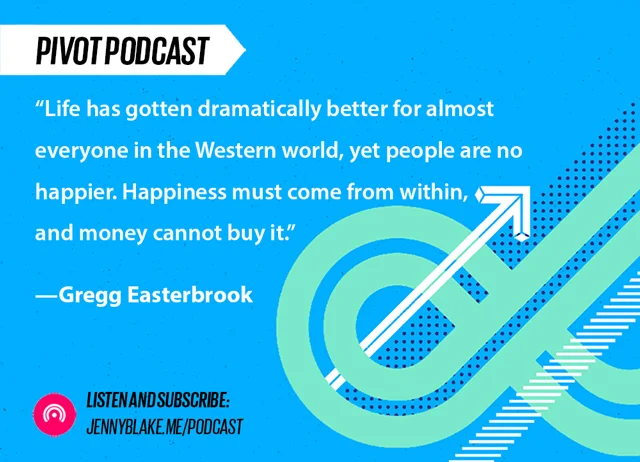"Life has gotten dramatically better for almost everyone in the Western world during the past half-century, yet people are no happier. Happiness must come from within, and money cannot buy it. Whether or not we attain happiness will probably always be unrelated to whether life is getting better."
—Gregg Easterbrook, The Progress Paradox: How Life Gets Better While People Feel Worse
According to Gregg Easterbrook, "The men and women at middle-class standards or above in the United States and European Union now live better than 99.4 percent of the human beings who have ever existed," including most of the royalty of history. And yet, we are no happier. How can this be?
We explore afflictions such as: choice anxiety, abundance denial, "call and raise the Joneses," collapse anxiety, the revolution of satisfied expectations, and meaning want. We also dive into their powerful antidotes: forgiveness, gratitude and optimism, as well as Gregg's earlier work on why talent is overrated (and the two ingredients to strive for instead).
More About Gregg Easterbrook
Gregg Easterbrook is the author of ten books, including The Progress Paradox (the topic of this episode) and his latest, The Game’s Not Over: In Defense of Football. He’s also a contributing editor of The Atlantic Monthly and the Washington Monthly, and writes the Tuesday Morning Quarterback column for the New York Times.
In prior jobs, he has been a national correspondent for The Atlantic Monthly, a contributing editor of the New Republic, a political columnist for Reuters, a football columnist for ESPN.com and for NFL.com, an editor of the Washington Monthly, a contributing editor to Newsweek and to U.S. News & World Report, a distinguished fellow of the Fulbright Foundation, a visiting fellow of the Brookings Institution, a bartender, a bus driver and a used-car salesman.
Topics We Cover
Why we're better off than 99% of humans that have ever lived, yet unhappiness has increased
We've done much better at increasing living standards than our sense of life satisfaction
Choice anxiety: on matters large (career) and small (grocery shopping)
The correlation between money and happiness: lacking money causes unhappiness, but having money does not cause happiness
Once you reach a decent material standard, money and happiness decouple—fulfillment, friendship, family, love, meaning—you can't buy those in a store regardless of how much money you have
The importance of optimism, gratitude and forgiveness—even for selfish reasons
"Call-and-raise the Joneses" angst, exacerbated by social media
Social media and news media overstate complaints and anger, as seen in the presidential campaign—makes the country seem much more angry than it actually is
Conservation of anxiety: we now focus on smaller and smaller problems
We didn't evolve to be happy-go-lucky; our ancestors who survived were warily scanning
Pareto Efficiency: is it okay for one person to become very rich so long as they do not harm others in the process of acquiring wealth?
Collapse anxiety: things seem to be going really well, yet we fear impending doom
His next book: why the world refuses to end, why the disasters we expect don't happen
On the pursuit for meaning in our careers: entitled, or the next logical step?
"It's a lot easier to buy something than develop a philosophy of life."
The shift toward earning a living from our art, thinking and expression
Will the next generation really be better off? Do our children need more, or is it now time to focus on sustaining what we have?
How production automation will affect the job market, what opportunities will arise
Resources Mentioned
Gregg's recent New York Times article: When Did Optimism Become Uncool?
Previous Pivot Podcasts: How to Become a Robot Whisperer, Kevin Kelly on Techno Literacy, Systems Thinking, Artifical Intelligence and Virtual Reality
Gregg's Books:
Check out other episodes of the Pivot Podcast here. Be sure to subscribe wherever you listen, and if you enjoy the show I would be very grateful for a rating and/or review! Sign-up for my weekly(ish) #PivotList newsletter to receive curated round-ups of what I’m reading, watching, listening to, and new tools I’m geeking out on.



![[Best Of] Trip Report—Oprah's Vision Tour: Your Life In Focus](https://images.squarespace-cdn.com/content/v1/54414faee4b03de3b679d82a/1518802175302-07RF5VNCG9WPVBNRCIB3/Audiogram_NoGuest.jpg)
![[Best Of] Penney & Jenny 12: Pandemic Opening Our Collective Pandora's Box (March 2020)](https://images.squarespace-cdn.com/content/v1/54414faee4b03de3b679d82a/1519166582514-8DP1YR6BTM1OM9FUNO1T/Audiogram_NoGuest.jpg)